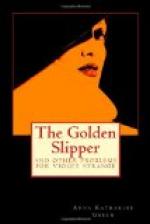The same fear and the same shrinking were observable in him as he returned from listening to the least conspicuous one, standing in a short corridor, where Violet could not follow him. But when, after a hesitation which enabled her to slip behind the curtain hiding the drawing-room door, he approached and laid his ear against the great one standing, as if on guard, at the foot of the stairs, she saw by the renewed vigour he displayed that there was comfort for him in its message, even before she caught the whisper with which he left it and proceeded to mount the stairs:
“It says No! It always says No! I will heed it as the voice of Heaven.”
But one conclusion could be the result of such an experiment to a mind like Violet’s. This partly touched old man not only held the key to the secret of this house, but was in a mood to divulge it if once he could be induced to hear command instead of dissuasion in the tick of this one large clock. But how could he be induced? Violet returned to Mrs. Postlethwaite’s bedside in a mood of extreme thoughtfulness.
Another day passed, and she had not yet seen Miss Postlethwaite. She was hoping each hour to be sent on some errand to that young lady’s room, but no such opportunity was granted her. Once she ventured to ask the doctor, whose visits were now very frequent, what he thought of the young lady’s condition. But as this question was necessarily put in Mrs. Postlethwaite’s presence, the answer was naturally guarded, and possibly not altogether frank.
“Our young lady is weaker,” he acknowledged. “Much weaker,” he added with marked emphasis and his most professional air, “or she would be here instead of in her own room. It grieves her not to be able to wait upon her generous benefactress.”
The word fell heavily. Had it been used as a test? Violet gave him a look, though she had much rather have turned her discriminating eye upon the face staring up at them from the pillow. Had the alarm expressed by others communicated itself at last to the physician? Was the charm which had held him subservient to the mother, dissolving under the pitiable state of the child, and was he trying to aid the little detective-nurse in her effort to sound the mystery of her condition?
His look expressed benevolence, but he took care not to meet the gaze of the woman he had just lauded, possibly because that gaze was fixed upon him in a way to tax his moral courage. The silence which ensued was broken by Mrs. Postlethwaite:
“She will live—this poor Helena—how long?” she asked, with no break in her voice’s wonted music.
The doctor hesitated, then with a candour hardly to be expected from him, answered:
“I do not understand Miss Postlethwaite’s case. I should like, with your permission, to consult some New York physician.”
“Indeed!”
A single word, but as it left this woman’s thin lips Violet recoiled, and, perhaps, the doctor did. Rage can speak in one word as well as in a dozen, and the rage which spoke in this one was of no common order, though it was quickly suppressed, as was all other show of feeling when she added, with a touch of her old charm:




